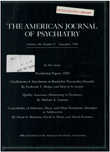Atenolol in seasonal affective disorder: a test of the melatonin hypothesis
Abstract
To test the hypothesis that the antidepressant effects of bright light in seasonal affective disorder are mediated by the suppression of melatonin, 19 patients with this disorder were given atenolol, which suppresses melatonin secretion, and placebo in a double-blind crossover study. No difference in antidepressant efficacy was found between drug and placebo in the sample as a whole, which argues against the melatonin hypothesis of phototherapy. However, in three of the patients atenolol provided repeated, marked, and sustained relief of symptoms, suggesting that it may be useful in treating the winter depressive symptoms of some patients with seasonal affective disorder.
Access content
To read the fulltext, please use one of the options below to sign in or purchase access.- Personal login
- Institutional Login
- Sign in via OpenAthens
- Register for access
-
Please login/register if you wish to pair your device and check access availability.
Not a subscriber?
PsychiatryOnline subscription options offer access to the DSM-5 library, books, journals, CME, and patient resources. This all-in-one virtual library provides psychiatrists and mental health professionals with key resources for diagnosis, treatment, research, and professional development.
Need more help? PsychiatryOnline Customer Service may be reached by emailing [email protected] or by calling 800-368-5777 (in the U.S.) or 703-907-7322 (outside the U.S.).



